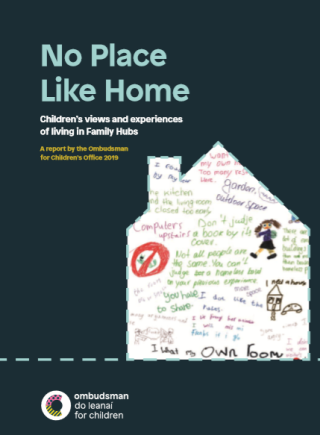‘No Place Like Home’ – Ombudsman’s Report highlights institutionalised deprivation in Family Hubs

The Government is failing the most vulnerable in Irish society. Homeless figures for February 2019 showed that 1,707 families accessed emergency accommodation that month, including 3,784 children. Housing policies which prioritise private investment over the common good and a lack of commitment to building social and affordable housing, mean that many of these families will remain homeless into the long term. Rather than put real investment into Housing First and social and affordable homes, the Government’s solution was to fund the building of increasing numbers of Family Hubs – communal living spaces which afford little dignity to their inhabitants.
The OCO Report on the experience of families living in Family Hubs does point out that, for some, they have been found to be better than hotel rooms, however in the long-term they remain an unsuitable solution.
In his Foreword to ‘First 5’, the Government’s Strategy for Babies, Young Children and their Families, the Taoiseach wrote of how “The first five years last a lifetime and have a lasting impact on the type of person we become. A happy and healthy start in life, one that provides children with positive and nurturing influences, is vitally important. Our children deserve the best start and opportunities in life to fulfil their potential.” How then, can Government defend the experiences of the children reported in the OCO’s report?
To give just one example from the Report:
“Hannah (aged 8), cried and told us that the Hub was “like a children’s jail”. She expressed extreme worry and fear for her younger brother Niall (aged 5) who had tried to run away from the Hub on several occasions. She told us that when her mother was having a shower she would sit on a chair in front of the door so her brother could not run away. Niall had sneaked out of the Hub once already and threatened to throw himself out of a bedroom window.”
No 8 year old should feel the weight of responsibility to protect their 5 year old brother from running away or jumping out of a window. And no 5 year old should feel that these are their only options.
Other children interviewed for the Report spoke of not being able to have friends over to visit, not having a quiet place to read or do homework, the experience of having to sign in and out, and experiences of bullying.
Deprivation
In 2007, the Government revised its deprivation indicators to reflect living standards at the time. This led to the development of an 11 item list, including the inability to have friends over for a drink or a meal once a month and having a morning, afternoon or evening out in the last fortnight for entertainment. This list recognises that social inclusion is an important facet of humanity. We, as human beings, need to feel connected to other people. To be included in the EU-SILC statistics on deprivation, a person must experience two or more types of enforced deprivation. In 2017, almost one million people living in Ireland were reported as living in deprivation. The children in the OCO’s Report report not being allowed to have friends in their room and having to be supervised by their parents if going to the local shop. Their enforced deprivation is a result of Government policy to provide hubs rather than homes.
In a press release on the recommendations of two reports on homelessness, issued in June 2018, Minister Murphy stated “Funding is not an issue and the Government will not be found wanting in supporting local authorities in both preventing families and individuals from entering homelessness, and working with those who are experiencing homelessness in securing suitable accommodation.” Suitable accommodation for the children living in Family Hubs is long-term homes. Because all children deserve the best start and opportunities in life to fulfil their potential.

GIVING A VOICE TO THOSE
WHO DON’T HAVE A VOICE
When you support Social Justice Ireland, you are tackling the causes of problems.
